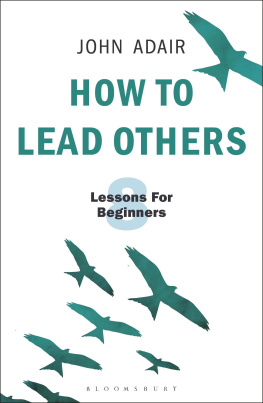Rick Pitino - Lead to Succeed: 10 Traits of Great Leadership in Business and Life
Here you can read online Rick Pitino - Lead to Succeed: 10 Traits of Great Leadership in Business and Life full text of the book (entire story) in english for free. Download pdf and epub, get meaning, cover and reviews about this ebook. year: 2001, publisher: Broadway, genre: History. Description of the work, (preface) as well as reviews are available. Best literature library LitArk.com created for fans of good reading and offers a wide selection of genres:
Romance novel
Science fiction
Adventure
Detective
Science
History
Home and family
Prose
Art
Politics
Computer
Non-fiction
Religion
Business
Children
Humor
Choose a favorite category and find really read worthwhile books. Enjoy immersion in the world of imagination, feel the emotions of the characters or learn something new for yourself, make an fascinating discovery.

- Book:Lead to Succeed: 10 Traits of Great Leadership in Business and Life
- Author:
- Publisher:Broadway
- Genre:
- Year:2001
- Rating:4 / 5
- Favourites:Add to favourites
- Your mark:
- 80
- 1
- 2
- 3
- 4
- 5
Lead to Succeed: 10 Traits of Great Leadership in Business and Life: summary, description and annotation
We offer to read an annotation, description, summary or preface (depends on what the author of the book "Lead to Succeed: 10 Traits of Great Leadership in Business and Life" wrote himself). If you haven't found the necessary information about the book — write in the comments, we will try to find it.
Lead to Succeed: 10 Traits of Great Leadership in Business and Life — read online for free the complete book (whole text) full work
Below is the text of the book, divided by pages. System saving the place of the last page read, allows you to conveniently read the book "Lead to Succeed: 10 Traits of Great Leadership in Business and Life" online for free, without having to search again every time where you left off. Put a bookmark, and you can go to the page where you finished reading at any time.
Font size:
Interval:
Bookmark:

LEAD TO SUCCEED
10 Traits
of Great
Leadership
in Business
and Life
R ICK P ITINO
with Bill Reynolds
Broadway Books
NEW YORK
Contents
Introduction:
LEARNING TO BE A LEADER
W hen I was twenty-four years old I was selected to be the basketball coach at Boston University, becoming at that time one of the youngest head coaches in the country. I was thrilled to be picked for that top spot, but the unmitigated euphoria of getting the job quickly ended. I looked around at these players who were now looking at me for all the answers. I realized that I had to be a leader.
But how?
Leaders are not born, I believe, or at least I felt that I had not been born to be one. Nor was there any weekend seminar I could attend, or any course I could take, at least none that I was aware of at the time. There was not a pill I could swallow that overnight was going to turn me into an enlightened leader, some magic potion to quickly give me all the right answers. I had to learn how to be a leader by trial and error, by figuring out what worked for me and what didnt. Theres no doubt I made my share of mistakes along the way. Gradually, though, by observing others who were in leadership positions, by seeing what worked and what didnt, I began to learn how to become an effective leader myself.
Ever since those early coaching years, I have been fascinated with the nature of leadership and its role in organizations.
What is the essence of great leadership?
Why are some people able to get other people to follow them, while other people dont seem to have this ability? Why are some people able to get other people to not only achieve their potential, but even move beyond it? Why are some people able to get others to achieve great things, while others cannot do this? Why do some companies grow, while others with just as much potential flounder, never seeing that potential actualized?
These are some key questions I asked myself as I studied leaders in all walks of life. And as I began to understand the reasons why certain people were effective leaders, and the traits they shared, this awareness eventually led to other more significant questions:
Are there certain traits of leadership that can be taught? If so, what are they?
Can anyone learn to be a more effective leader? If so, how?
These questions may have never been so important as they are today. From politics to business, and from education to coaching, the concept of leadership is under a national microscope. Companies are merging, streamlining, trying to position themselves for a future that seems to be changing by the week. Everyone in business today is under pressure to cut costs, improve the quality of goods and services, try to stay ahead of the competition and the technology curve, and do what they do better, all within a climate of uncertainty. The business climate changes rapidly, and while no one knows where the future is going to take us, we all know that its going to be somewhere different.
With so many aspects of our work and personal lives up in the air, we need leadership more than ever as we head into a new century. Good leaders provide a vision. Good leaders take away the doubt and uncertainty, the fear of the future. Good leaders provide an environment in which other people can grow. Good leaders instill values. Good leaders make the people around them more successful.
There is little mystery to this. Successful organizations dont just happen, suddenly appearing in some puff of smoke. They dont happen by accident. Nor do they happen in a vacuum. They happen because of strong leadership, some vision thats able to be actualized.
This always has been true, as timeless as leadership itself, but the entire concept of leadership has become muddled and confused. This is especially true in this era where traditional roles have been questioned, where the entire concept of authority is different from what it was a generation ago.
We now see, in politics and business, leaders who cannot lead themselves trying to lead others. We see people trying to lead by being friends with the people they are leading, and then wondering why it doesnt work. We see people in leadership situations in the workplace who possess few, if any, leadership skills, and then we wonder why both production and morale in that particular workplace is so low. We see people fail all the time as leaders and bring down organizations with them, affecting other peoples lives. We see companies that start out with great potential, only to hit some invisible plateau, seemingly unable to move forward. We see people fail simply because they dont possess the toolsor understand the traitsit takes to be successful as leaders. Simply having the title doesnt make you a leader. This is what I had to learn back when I was a young coach, just starting out in my chosen profession. Its an important lesson, maybe the most important lesson. People are placed in leadership positions and think that simply having the title makes them effective leaders, that simply by being called the boss solves all the problems and makes everything function both smoothly and efficiently. It does not. Not even close. Leaders are only effective when they effectively lead the people of whom theyre in charge. More to the point, leaders are only successful when the people theyre leading become successful.
Sounds simple, right?
Yet this is overlooked time and time again. People are placed all the time in positions of leadershipwhether its in business, education, sports, whateverand told, Good luck. They are given a pat on the back and sent on their way. They are sent to lead others on little more than a wing and a prayer. No matter that theyre ignorant of many of the skills needed to be effective leaders or that they immediately make time-honored mistakes, for the simple reason that no one gives them any alternatives. No matter that theyre ill-prepared to be leaders and have about as much chance to be successful as they do in winning the lottery.
Some, of course, eventually learn on their own through trial and error and become effective leaders. Some never do, will forever seem as if theyre working on intricate puzzles they can never solve, forever walking on some treadmill to failure.
I can spot a poor leader a mile away.
Theyre the people who are giving in all the time, the people who operate with a lack of discipline. As soon as I hear the expression Hes a players coach, or Hes a boss whom everyone likes, I know that eventually, the discipline is going to break down; its just a matter of time. When you lack disciplinebe it in an office or on a basketball teamyour chances for success have been significantly narrowed.
Discipline is your foundation: You have to have it, the people you are leading have to have it, the group has to have it. Disciplineshowing up, putting in the effort, taking responsibility for your actionssets the tone for all the work you do. Without it, all your great intentions will soon begin to unravel, and your vision cannot be actualized. Without discipline, your game plan will start to become unglued the first time you are severely tested.
I can put up with many things from the people who work for me, whether its immaturity, poor fundamentals, bad techniques, lack of focus, or any of the laundry list of negatives that are out there. But I will not put up with a lack of effort. As a leader, I cannot tolerate that. The other negatives can be improved upon, changed, but a lack of effort undermines everything that you have worked for, and that is why a leader must maintain good discipline among those he or she leads.
Font size:
Interval:
Bookmark:
Similar books «Lead to Succeed: 10 Traits of Great Leadership in Business and Life»
Look at similar books to Lead to Succeed: 10 Traits of Great Leadership in Business and Life. We have selected literature similar in name and meaning in the hope of providing readers with more options to find new, interesting, not yet read works.
Discussion, reviews of the book Lead to Succeed: 10 Traits of Great Leadership in Business and Life and just readers' own opinions. Leave your comments, write what you think about the work, its meaning or the main characters. Specify what exactly you liked and what you didn't like, and why you think so.





